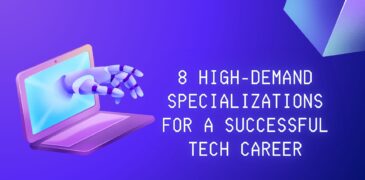From artificial intelligence and cybersecurity to data science and cloud computing, these high-demand specializations offer professionals the opportunity to excel in dynamic fields with ample job opportunities and competitive salaries. As industries increasingly rely on cutting-edge technology to drive innovation and efficiency, individuals equipped with expertise in these specialized areas are poised to make significant contributions and thrive in the ever-expanding tech sector. Understanding these in-demand specializations is crucial for aspiring tech professionals seeking to carve out fulfilling and prosperous careers.
Artificial Intelligence (AI) and Machine Learning
Artificial Intelligence (AI) and Machine Learning represent groundbreaking fields at the forefront of technological innovation. AI aims to create systems that can simulate human intelligence, while machine learning is a subset of AI focused on developing algorithms that enable computers to learn from and make predictions based on data.
In recent years, AI and machine learning have revolutionized numerous industries, from healthcare and finance to retail and manufacturing. AI-powered systems can automate repetitive tasks, analyze vast amounts of data for valuable insights, and make intelligent decisions in real-time, driving efficiency, productivity, and innovation.
Applications of AI and machine learning are diverse and far-reaching. They include natural language processing for speech recognition and language translation, computer vision for image recognition and object detection, recommendation systems for personalized content and product recommendations, and predictive analytics for forecasting trends and behaviors.
Cybersecurity
Cybersecurity is a critical field focused on protecting digital systems, networks, and data from cyber threats. In today’s increasingly connected world, where organizations and individuals rely heavily on technology for communication, commerce, and critical infrastructure, cybersecurity plays a crucial role in safeguarding against malicious actors and unauthorized access.
Cyber threats come in various forms, including malware, phishing attacks, ransomware, and denial-of-service (DoS) attacks, among others. Cybersecurity professionals are tasked with identifying and mitigating these threats, implementing robust security measures, and responding effectively to security incidents.
The importance of cybersecurity cannot be overstated, as cyber attacks can have devastating consequences, ranging from financial losses and reputational damage to compromise of sensitive information and disruption of services.
Cloud Computing
Cloud computing has revolutionized the way businesses and individuals store, access, and manage data and applications. It involves delivering computing services over the internet. Allowing users to access computing resources. Such as storage, processing power, and software on-demand, without the need for extensive on-premises infrastructure.
One of the key advantages of cloud computing is scalability, enabling organizations to rapidly scale resources up or down based on demand. Thereby optimizing costs and improving operational efficiency. Additionally, cloud computing offers flexibility, allowing users to access resources from anywhere. It is done with an internet connection, fostering remote work and collaboration.
Cloud computing encompasses various service models, including Infrastructure as a Service (IaaS), Platform as a Service (PaaS), and Software as a Service (SaaS). IaaS provides virtualized computing resources such as servers, storage, and networking infrastructure. While PaaS offers a platform for developing, testing, and deploying applications.
Data Science and Analytics
Data science and analytics have emerged as indispensable disciplines in today’s data-driven world. There organizations seek to derive actionable insights from vast amounts of data to make informed decisions and drive strategic initiatives. It encompasses the processes and methodologies for extracting knowledge and insights. From structured and unstructured data through statistical analysis, machine learning, and predictive modeling.
Data scientists play a pivotal role in unlocking the value of data by leveraging analytical techniques and advanced algorithms to identify patterns, trends, and correlations that drive business outcomes. They possess a diverse skill set that includes proficiency in programming languages such as Python and R. Expertise in statistical analysis and data visualization, and knowledge of machine learning algorithms and data mining techniques.
Analytics, on the other hand, focuses on analyzing data to uncover meaningful insights and inform decision-making across various domains, including marketing, finance, healthcare, and operations.
DevOps and Site Reliability Engineering (SRE)
DevOps and Site Reliability Engineering (SRE) are two closely related disciplines that focus on improving collaboration between development and operations teams and ensuring the reliability, scalability, and performance of software systems.
It emphasizes a cultural shift, collaboration, and automation to streamline the software development and deployment process. It aims to break down silos between development, operations, and other IT functions. Fostering a culture of continuous integration, delivery, and feedback. DevOps practices include infrastructure as code, continuous integration and deployment (CI/CD). And also automated testing, enabling teams to release software more frequently and reliably.
Site Reliability Engineering (SRE), pioneered by Google, focuses on maintaining the reliability and availability of large-scale systems through engineering and operations principles.
Software Engineering
Software engineering is a multidisciplinary field that focuses on the design, development, testing, and maintenance of software systems. It encompasses a structured and systematic approach to building high-quality software solutions that meet the needs of users and stakeholders.
Software engineers employ various methodologies, frameworks, and tools to create software products efficiently and effectively. They analyze requirements, design architecture, write code, and test software to ensure it meets functional and non-functional requirements. Throughout the software development lifecycle, software engineers collaborate with stakeholders, including clients, users, and other members of the development team, to deliver successful outcomes.
Key principles of software engineering include modularization, abstraction, encapsulation, and reusability. That enable developers to create scalable, maintainable, and robust software solutions.
Internet of Things (IoT)
The Internet of Things (IoT) refers to the network of interconnected devices embedded with sensors, software, and other technologies that enable them to collect and exchange data over the internet. This interconnected ecosystem encompasses a wide range of devices, including smartphones, wearable devices, home appliances, industrial machinery, vehicles, and more.
The IoT revolutionizes various industries by enabling real-time monitoring, automation, and optimization of processes and operations. Healthcare devices such as, wearable fitness trackers and remote patient monitoring systems allow for continuous health monitoring and personalized care. In manufacturing, sensors on equipment and machinery enable predictive maintenance, reducing downtime and improving efficiency. In smart homes, connected devices such as smart thermostats, lighting systems, and security cameras offer convenience, energy savings, and enhanced security.
Blockchain and Cryptocurrency
Blockchain, the underlying technology behind cryptocurrencies like Bitcoin and Ethereum. It is a decentralized, distributed ledger system that records transactions across a network of computers in a secure and transparent manner. Each transaction is cryptographically linked to the previous one, forming a chain of blocks, hence the name “blockchain.” This technology eliminates the need for intermediaries, such as banks or financial institutions. By enabling peer-to-peer transactions with enhanced security and immutability.
Cryptocurrency, a digital or virtual currency that utilizes cryptography for security and operates independently of central authorities, has gained widespread adoption as a medium of exchange, investment, and store of value. Bitcoin, the first and most well-known cryptocurrency, introduced the concept of decentralized digital currency. Inspiring the creation of thousands of alternative cryptocurrencies, or altcoins.
Blockchain and cryptocurrency have diverse applications beyond finance. Including supply chain management, healthcare, voting systems, and identity verification.
Conclusion
In conclusion, the high-demand specializations outlined present exciting opportunities for individuals pursuing successful careers in the tech industry. From artificial intelligence and cybersecurity to data science and blockchain, these fields offer diverse paths for innovation and growth. Embracing these specializations not only opens doors to lucrative job prospects but also enables professionals to contribute to transformative advancements in technology.
Read more:







